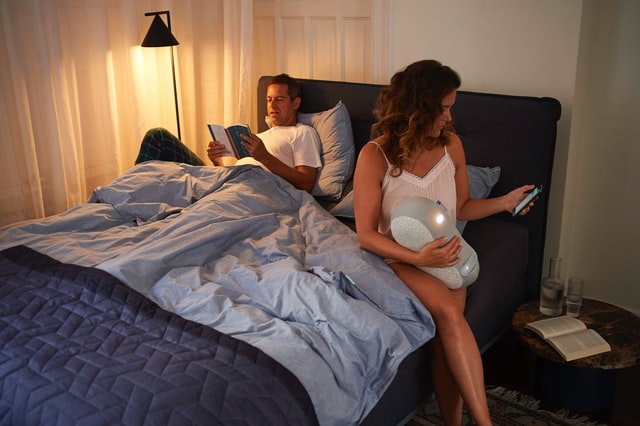
The National Sleep Foundation reports that the average person needs seven or more hours of sleep each night to function at an optimum level.
While it may seem like only lazy people need this much sleep, there are many reasons why you might need it too.
Sleep is essential to your life, especially if you want to maintain good health. It’s important that you set your sleep schedule correctly and take care of yourself at the same time.
1. Exposure To Light
Your body naturally follows a circadian rhythm that dictates when you should be awake versus when you should be asleep.
To help maintain your natural sleep cycle, try to expose your eyes to natural light during the day and make sure to protect them from artificial light (especially screens) after dusk.
Your body requires darkness in order to get a quality night of rest. If possible, try to keep some kind of barrier or blinds on the windows in your bedroom.
It might help if you put dark-colored curtains on these windows too so that it’s almost like sleeping in a cave!
2. Get Relaxation Practices
If you can’t turn off your brain, try some relaxation practices. Deep breathing, meditation, and visualization are proven relaxation practices to combat insomnia and get quality sleep.
However, don’t use anti-anxiety drugs or alcohol to help you relax since they can actually cause your body to have a more challenging time falling asleep.
Additionally, getting a good mattress for couples will help you relax and fall asleep asap.
3. Keep A Consistent Bedtime

Photo Credit: Unsplash
Try to keep a consistent bedtime every night at the same time so that your body will know when it’s time to wind down.
If you need an alarm to wake up in the morning, try to get your body working with a gradual wake-up time that gets earlier by 15 minutes each day.
4. Reduce Noise
If you’re a light sleeper or live in a noisy urban environment, keep your bedroom as quiet as possible. Even small noises like the sounds of cars driving down the street can disrupt your sleep.
Use white noise machines and earplugs to block out annoying ambient noise while also helping you relax before bed.
If you have kids, consider putting them on a sleep schedule at least a few weeks before you embark on yours, so they fall asleep more easily and don’t disturb your own rest with late-night shenanigans.
5. Skip Napping

Photo Credit: Pixabay
Your body needs sleep, but napping can actually interfere with your ability to fall asleep. A recent study found that people who took a nap had more difficulty falling asleep and stayed awake longer than those who didn’t nap.
Skip the power nap and try to keep your sleep schedule as consistent as possible, especially if you are trying to recover from an illness or illness medication.
6. Eat Early
Foods like carbohydrates have a stimulating effect on the brain, making it difficult for people to fall and stay asleep at night.
Try eating earlier in the evening to have less food, which will help settle your stomach before bedtime.
7. Get Regular Exercise

Photo Credit: Unsplash
Exercise can actually help you fall asleep faster, according to a study in the journal Exercise and Sports Sciences Review.
Just don’t work out too close to your bedtime because cardio or other high-energy exercises can leave you feeling wired instead of tired.
On the flip side, try not to nap immediately after exercising either because this can affect your sleep cycle as well.
8. Keep Your Bedroom Cool
Your bedroom should be a relaxing place reserved for sleep, not for activities that make your body more energized, like watching TV or using a computer or tablet.
According to the National Sleep Foundation, your bedroom should also be cool with temperatures between 60 and 68 degrees Fahrenheit.
When it’s hot and humid outside, the heat can make sleeping uncomfortable so try to keep your bedroom cool during the summer months if possible.
9. Consider Melatonin
Schedule an appointment with your doctor to discuss the benefits and side effects of melatonin supplements, including whether or not you’re a good candidate for taking these supplements.
If you are a good candidate for melatonin supplements, talk to your doctor about how much is suitable for you and what kind of supplement is best suited for you.
The Food and Drug Administration (FDA) does not regulate melatonin, so talk with your doctor about safe doses that could help you sleep better without causing any harmful side effects.
The Bottom Line
A consistent sleep schedule is the best way to ensure that you’re getting the right amount of sleep each night.
It may be easier said than done, but try putting together a routine that lets you get the best rest possible while also giving your body plenty of time to recover from daily activities.
For example, if you exercise on the weekends, try planning it out so that you finish your last workout by around 6 pm and can then have plenty of time to enjoy a relaxing evening before bedtime.
About The Author:
Nick Favreau is an expert mattress writer, whose unbiased reviews and in-depth analyses of mattresses have made him a trusted source of information for those looking for quality sleep.

![[Infographic] Exploring Sleep Debt: Strategies for a Restful Night's Sleep Exploring Sleep Debt: Strategies for a Restful Night's Sleep](https://www.safeandhealthylife.com/wp-content/uploads/2024/01/Sleep-Debt-150x150.webp)


